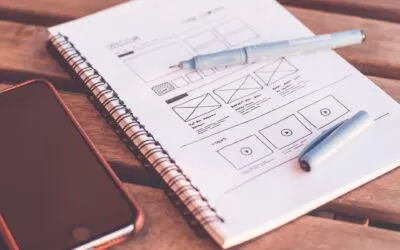Hiring a website designer can seem like a daunting task, and for the most part, you’d be right. There are hundreds of designers out there who claim they can help you build the website of your dreams, yet fall short in one aspect or another. Many designers on the market may not be qualified or do not have what it takes to satisfy your needs.
If you want to hire a web designer on a budget, you need to know how to tell the difference between an affordable but good web designer and one who is not so good. Below we’ll highlight ten tips to help you hire a website designer that’ll succeed in helping you build your website without costing a small fortune.
Your 10 Tips For Hiring a Good Web Designer
1. Overpromising Means Underdelivering
Website design freelancers and agencies alike have a number one priority, and that’s winning your business. Earning a new website design customer is valuable, it pays the bills, and keeps our agencies running. Without your business, agencies are sunk. So what do most freelancers and web design firms do to make sure you choose them at the end of the day? They lie. They overpromise what they can create for you and the results you’ll get from it. If you’ve ever heard “We promise you’ll be in the #1 spot on Google” then you’ve been a victim of the “overpromise” strategy. It’s challenging to spot someone who is overpromising, as it sounds really good to your ears, but the disappointment comes once you start working with them. Oftentimes the process or the results aren’t anything like they said they would be and you’re left disappointed and angry at both yourself for believing it and the designer for taking advantage of you.
To avoid falling for overpromising, use social proof to your advantage. Take a hard look at testimonials and reviews of your designer. Make sure they appear reputable and take note of the details mentioned in the reviews about the designer’s skillset, communication skills, and if the client felt satisfied with the end result. Also, try to see their work for yourself and get a look at their portfolio (we cover more of this in Tip #8)
2. Do not hire a designer who only uses templates
Do not hire a web designer who makes you select between a handful of preset templates as their designs. You want a designer who is going to use their skills and expertise to create a website design that’s unique to your business, yet beautiful, functional, and easy-to-use for your clientele. A skilled designer may use templates for inspiration or as the base layer of a design, but they should never simply be dropping a template in and calling the site completely done. That’s not what hiring a web designer is all about.
3. Do not hire someone who works for free
Even if the work is for charity, someone has to design the website and that person deserves to get paid for his work, no matter how noble his or her cause may be. While plenty of people start by designing for free to get a portfolio together, this usually means you are the test subject, and therefore their communication, design process, and the final outcome are unlikely to be polished. You might save a bit of money, but you’ll be paying for it in extra time spent figuring everything out at the same time your designer is.
There are so many web designers around the world who are more than ready to give their services for an affordable rate. While it won’t be free, you can find talented website design freelancers on sites like Upwork or Freelancer.com who are remarkably affordable for their level of expertise. Just remember, cheap doesn’t always mean good and you have to be really careful when choosing a designer that offers you the services at a deep discount.
4. Promises of Unbelievable Speed are usually Unbelievable
We’ve all heard it before: “I can get it done fast” or my favorite “I can start right now”, but rarely do these promises ever live up to the hype. Fast does not always mean good, and oftentimes we as consumers are so focused on speed of service, that we become blind to other red flags of the service offering. Do not hire someone who promises unbelievably quick results. If you’re getting multiple quotes (which you should, see tip #6) and a particular freelancer is undercutting the time it’ll take rather significantly, then you can be certain they will cut corners and produce a poor quality website in order to meet your deadline. Don’t worry, there’s a large cross-section of web designers who are both fast and good, but you must be weary about overpromising on speed.
5. Get referrals
Asking for referrals from your friends, family, and business connections is one of the best ways to find out about a web designer’s work. If you are satisfied with the work that they have done for your friends then they can create something just as good for your business as well. Additionally, a referral may be able to give a bit more insight into how the process, customer service, and behind-the-scenes work was with the designer, instead of only the final outcome.
6. Interview Several Designers
You should always interview several designers before hiring the right one. Designers are different, they have various skill sets, communication styles, pricing, and services. Come prepared to these conversations to know what you’re looking for in a website and make sure to ask lots of questions. Additionally, make sure to ask to see any example sites or case studies they can provide to evaluate the quality of their work, without simply taking their word for it.
7. Choose based on experience:
When hiring a freelance web designer, make sure you ask for client references. While building a website that looks great is an important part of the design process, it is equally critical to have a site that functions well and is easy to use. Ask your prospective designer for client references so you can call each of them directly and ask about their experience with the designer.
While this step may seem unnecessary, it will give you a better idea of whether or not your prospective web designer will be able to create the kind of website you want. You should also choose your designer based on his or her experience with designing websites. This may sound obvious, but you’ll find many web designers on your search who are very new to website designing as a hobby or school project. If you are on an extremely low budget this may be a useful option for you, but for the vast majority of business owners, their time is valuable and would be wasted working with someone who is inexperienced or inefficient.
8. Check your web designer’s portfolio
Before hiring any web designer, it is advisable to first check his portfolio. Checking a designer’s portfolio is standard operating procedure and your potential designer should have one ready to share. Viewing their portfolio of previously designed sites will provide you with an idea of their style, skill sets, and eye for details. Pay close attention to the flow of the site, the layout of pages, if you ever feel lost or without an obvious next action, and if the style of the design feels like it’s something you could see your own website utilizing. Try not to criticize the designer on any of the text, images, or content of the site besides the artistic elements, as those are often dictated by the client, not the designer themselves.
9. Find a web designer who speaks your language
More times than I’d like to admit, I’ve chosen freelancers based on their pricing as the primary criteria. But one thing that continues to prove the best way to narrow down my search criteria of who is going to be a good fit to work with, is language. In my case, a fluent English speaker is a must-have criteria, and nowadays I put even more weight on native English speakers. I’ve worked with freelancers and talented agencies from all across the world. While I’ve had amazing experiences with European, South American, and Asian designers, the best relationships and experiences I continue to have are those with native-English backgrounds and particularly ones in North America. It may feel like a small detail, but being able to communicate fully with your web designer cannot be taken for granted. It’s highly essential for you and your web designer to understand each other clearly so that your business needs translate into a beautiful website design.
10. Know the basic details of what you need for your website
If you have an idea of what you want your website to look like and what features it should have, then share that information with your web designer. This information is invaluable to your website designer. Any information you can provide is one less assumption your website designer may have to make on your behalf. Coming to the website design conversation with some ideas or competitor sites you like could help speed up the design process and eliminate unnecessary rework.
Takeaway
In the end, finding a good web designer to work with can be tricky. But there are a few things that you can look for to help set yourself apart from other clients and make sure you hire someone who will give you a good value while also delivering on their end of the deal. By making your expectations clear, communicating early and often, and following these tips, you should be able to find an affordable designer who fits your needs just right.





